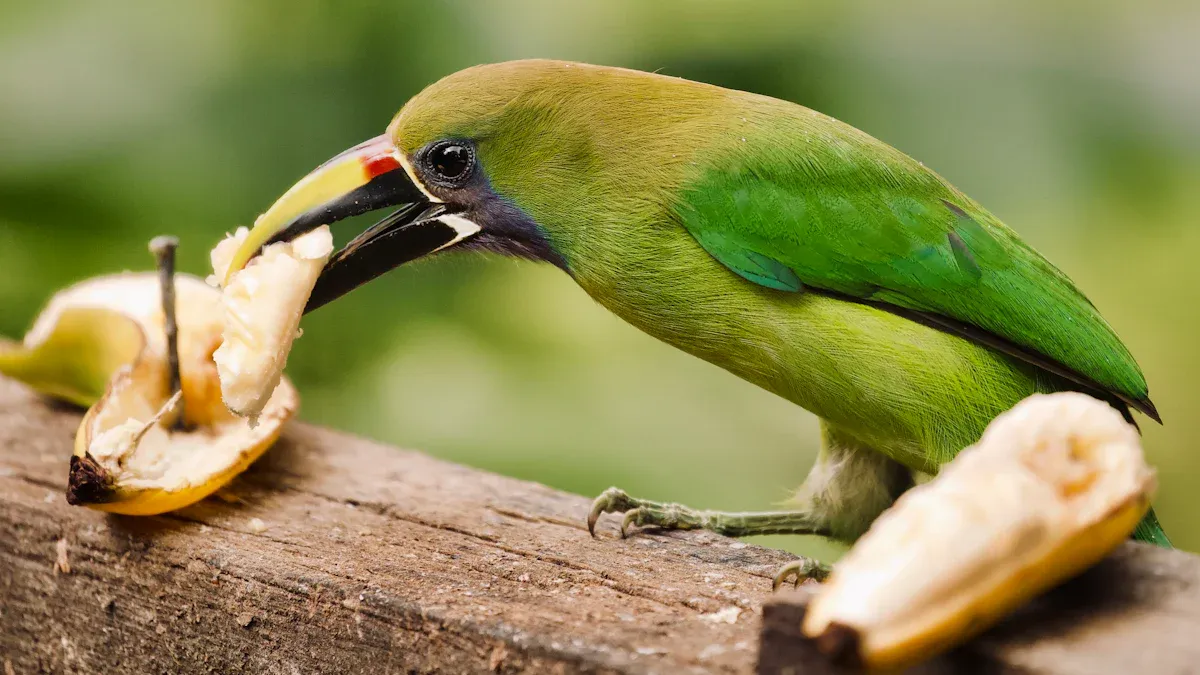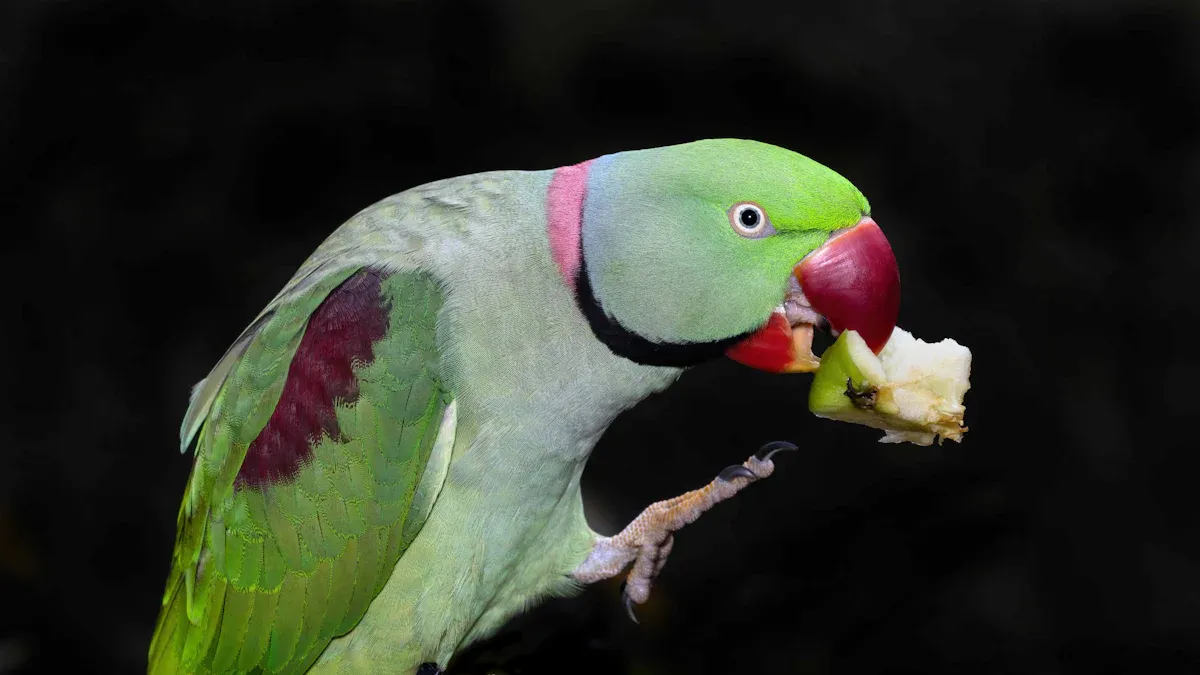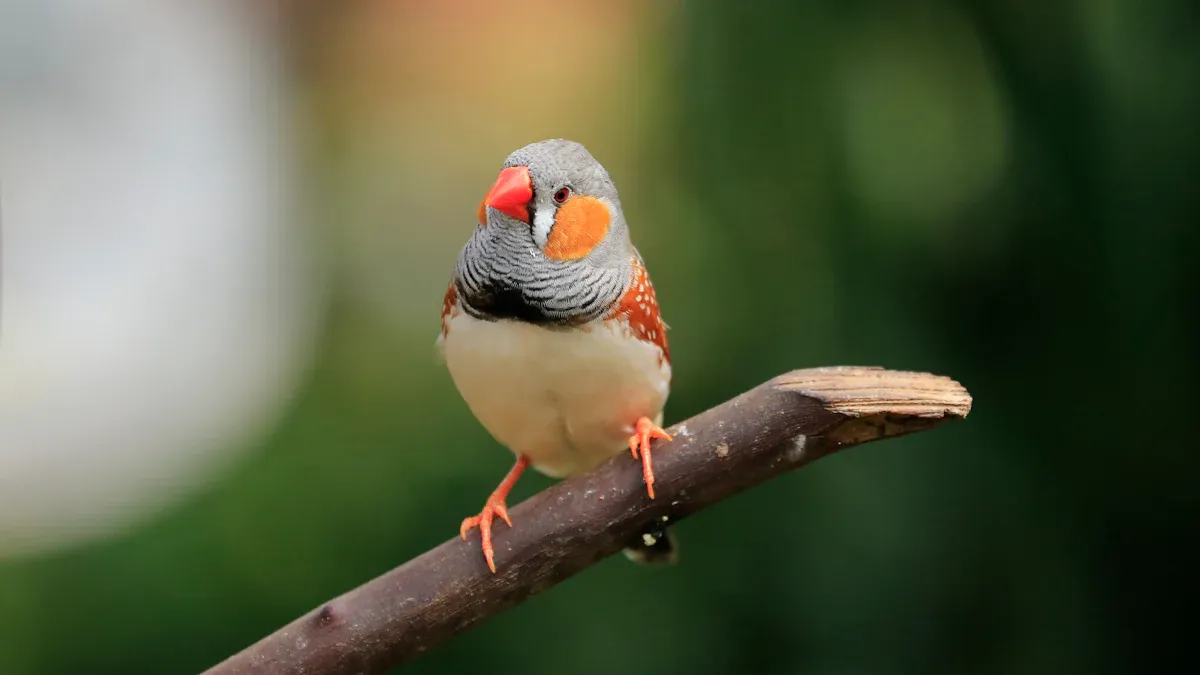
Mealworms for parrot serve as a powerhouse of essential nutrients. They support a balanced diet and promote overall health. By incorporating mealworms, pet owners can significantly enhance their parrot’s diet, leading to happier and healthier birds.
Key Takeaways
- Mealworms are a rich source of protein, essential for muscle development and overall health in parrots.
- Incorporating mealworms into a parrot’s diet enhances nutrient intake, supporting energy levels and feather health.
- Introduce mealworms gradually and monitor your parrot for any allergic reactions to ensure a safe and healthy diet.
Nutritional Benefits of Mealworms for Parrot

Mealworms for parrot offer a wealth of nutritional benefits that can significantly enhance a bird’s diet. Understanding these benefits helps pet owners make informed choices about their parrot’s nutrition.
High Protein Content
One of the standout features of mealworms is their impressive protein content. Dried mealworms contain approximately 50 grams of protein per 100 grams. This high protein level makes them a superior option compared to many common parrot foods, which typically have lower protein levels.
- Mealworms are essential for muscle development in parrots.
- They provide vital amino acids that support growth and energy.
- During molting, parrots require more protein, and mealworms serve as a reliable source for feather regrowth.
This protein-rich treat can help maintain a parrot’s strength and vitality, ensuring they remain active and healthy.
Essential Fatty Acids
Mealworms also contain healthy fats, ranging from 13% in live worms to as much as 43% in dried ones. These fats include essential fatty acids like linoleic and oleic acid, which play crucial roles in a parrot’s health.
| Fatty Acid Type | Quantity Range (% of Total Fatty Acids) | Notes |
|---|---|---|
| Oleic acid (C18:1 n-9) | 32.97% – 46.74% | Predominant fatty acid in mealworms |
| Linoleic acid (C18:2 n-6) | 22.79% – 38.98% | Second most abundant fatty acid |
| α-Linolenic acid (C18:3 n-3) | Up to 17% | Can be increased by diet manipulation |
| Palmitic acid (SFA) | 12.80% – 17.81% | Main saturated fatty acid |
These essential fatty acids provide energy for flying and playing, support brain health, and help maintain shiny and smooth feathers. They also reduce stress during high activity periods, making mealworms an excellent addition to a parrot’s diet.
Vitamins and Minerals
In addition to protein and healthy fats, mealworms are rich in various vitamins and minerals. They contain B-vitamins such as B1, B2, B3, B5, and B6, which are vital for metabolism and energy production in parrots.
- Iron supports bone health.
- Calcium strengthens eggshells, crucial for nesting birds.
- Zinc aids in immune function.
- Copper and manganese are important for overall health.
| Vitamin/Mineral | Amount |
|---|---|
| Calcium | 0.05% |
| Phosphorus | 1.03% |
| Manganese | 23 ppm |
| Zinc | 144 ppm |
These nutrients play significant roles in maintaining a parrot’s overall health. However, it is essential to remember that mealworms should not be the sole food source. A balanced diet that includes a variety of fruits, vegetables, seeds, and nuts is crucial for optimal health.
Comparison with Other Feed Options for Parrot
When considering the best diet for parrots, it is essential to compare mealworms with other common feed options. Each type of food offers unique benefits and drawbacks. Understanding these differences can help pet owners make informed decisions.
Seeds vs. Mealworms
Seeds are a popular choice for many parrot owners. However, they often lack the balanced nutrition that parrots need. While seeds can provide some energy, they typically contain high levels of fat, which can lead to obesity and related health issues.
- Many captive parrots suffer from malnutrition due to seed-only diets.
- A seed-heavy diet can result in deficiencies in calcium, sodium, and iron.
- In contrast, mealworms offer a protein content of 51%, which is beneficial for muscle development and overall health.
| Nutrient | Mealworms (Tenebrio molitor) | Soybean Meal | Fishmeal |
|---|---|---|---|
| Protein | 51% | 49-56% | 60% |
| Fat | 19% | N/A | N/A |
| Potassium (K) | Higher than Zophobas morio | N/A | N/A |
| Magnesium (Mg) | Higher than Zophobas morio | N/A | N/A |
| Zinc (Zn) | Higher than Zophobas morio | N/A | N/A |
| Phosphorus (P) | Higher than Zophobas morio | N/A | N/A |
| Calcium (Ca) | Lower than Zophobas morio | N/A | N/A |
Mealworms provide a more balanced nutrient profile, making them a superior choice for maintaining a parrot’s health.
Pellets vs. Mealworms
Pellets are often recommended as a staple diet for parrots. They are formulated to provide a balanced selection of nutrients. However, many parrots can become bored with pellets, leading to a lack of interest in their food.
- A diet consisting of 75% pellets and 25% produce can achieve recommended nutrient levels.
- Mealworms can enhance this diet by adding variety and excitement.
- They offer a significant protein boost, essential for muscle growth and feather development.
Parrots fed primarily on pellets may still benefit from the occasional treat of mealworms. This combination can help prevent nutritional deficiencies and keep parrots engaged during mealtime.
Fresh Fruits and Vegetables
Fresh fruits and vegetables are vital components of a parrot’s diet. They provide essential vitamins, minerals, and antioxidants. However, they often lack sufficient protein, which is crucial for muscle development and repair.
- Parrots require protein for overall health, and fresh produce alone may not meet this need.
- Mealworms complement fruits and vegetables by providing a rich source of protein and essential fatty acids.
- When combined, they enhance nutrient intake, supporting feather development and overall well-being.
Incorporating mealworms into a diet that includes fresh produce can lead to happier, healthier parrots. This combination ensures that parrots receive a well-rounded diet that meets all their nutritional needs.
Practical Tips for Feeding Mealworms for Parrot

How to Introduce Mealworms
Introducing mealworms to a parrot’s diet can be an exciting experience. Start by offering a small amount to gauge their interest. Many parrots find mealworms irresistible. If they show enthusiasm, gradually increase the quantity. This approach helps them adapt to the new treat without overwhelming their digestive system.
Recommended Serving Sizes
Mealworms should be treated as an occasional supplement rather than a primary food source. For non-breeding parrots, a serving of 1-2 mealworms per week is sufficient. During molting or breeding seasons, owners may increase this to 3-4 mealworms weekly. Always observe your parrot’s behavior and health to ensure they are thriving on this diet.
Best Practices for Storage
Proper storage of mealworms is crucial to maintain their nutritional quality. Here are some effective storage tips:
- Store mealworms in a cool, dry place to prevent mold and mites.
- Regularly check for contamination, such as mold or waste.
- Use a labeled container to track storage time and type of mealworms.
For live mealworms, consider these additional practices:
- Use a large, smooth-sided container to prevent overheating.
- Provide bedding made of oatmeal or bran, kept about 3 inches deep.
- Ensure mealworms are well-hydrated with raw vegetables or gel water sources.
Dried mealworms can last longer than live ones. Here’s a quick overview of their storage duration:
| Storage Condition | Duration |
|---|---|
| Refrigerated (45-50°F) | 6-10 weeks |
| Room Temperature | 3 weeks |
By following these tips, pet owners can ensure their parrots enjoy the benefits of mealworms while maintaining their health and happiness.
Addressing Concerns and Misconceptions about Mealworms for Parrot
Allergies and Sensitivities
Some parrots may experience allergies or sensitivities to mealworms. Signs of an allergic reaction can include changes in behavior, feather plucking, or digestive issues. Pet owners should monitor their birds closely when introducing mealworms. If any adverse reactions occur, it is wise to consult an avian veterinarian for guidance.
Ethical Considerations
Feeding live mealworms raises ethical questions regarding the treatment of insects. The potential sentience of insects prompts caregivers to consider their responsibilities. It is essential to treat all animals humanely. Many pet owners choose dried mealworms as a more ethical alternative. Dried mealworms reduce the risk of disease and still provide essential nutrients.
Note: Parrots can enjoy a variety of insect treats, but moderation is key.
Overfeeding Risks
Overfeeding mealworms can lead to nutritional imbalances in parrots. High protein and fat content may cause health issues if consumed excessively. To prevent overfeeding, follow these guidelines:
- Offer mealworms as occasional treats, not daily.
- For budgies, provide 1-2 mealworms 2-3 times a week.
- Always avoid overfeeding due to their high-fat content.
Observing a parrot’s reaction to mealworms helps adjust their diet accordingly. By maintaining a balanced diet, pet owners can ensure their feathered friends remain healthy and happy.
Mealworms for parrot serve as a valuable addition to their diet. They provide essential protein, which supports muscle development and feather strength. Additionally, mealworms offer vital amino acids and energy, especially during active periods.
Key Benefits of Mealworms:
- High protein content promotes growth and health.
- Nutrient-rich, supporting metabolism and immune function.
- Encourages natural behaviors, enhancing mental stimulation.
Encouraging a varied diet with mealworms can lead to happier, healthier parrots.
FAQ
How often should I feed mealworms to my parrot?
Feed mealworms as an occasional treat, about 1-2 per week for non-breeding parrots. Increase during molting or breeding seasons.
Can all parrots eat mealworms?
Most parrots can enjoy mealworms. Monitor for allergies or sensitivities when introducing them to your bird’s diet.
Are live or dried mealworms better for parrots?
Both live and dried mealworms are nutritious. Choose based on your parrot’s preference and your comfort level with feeding options.


